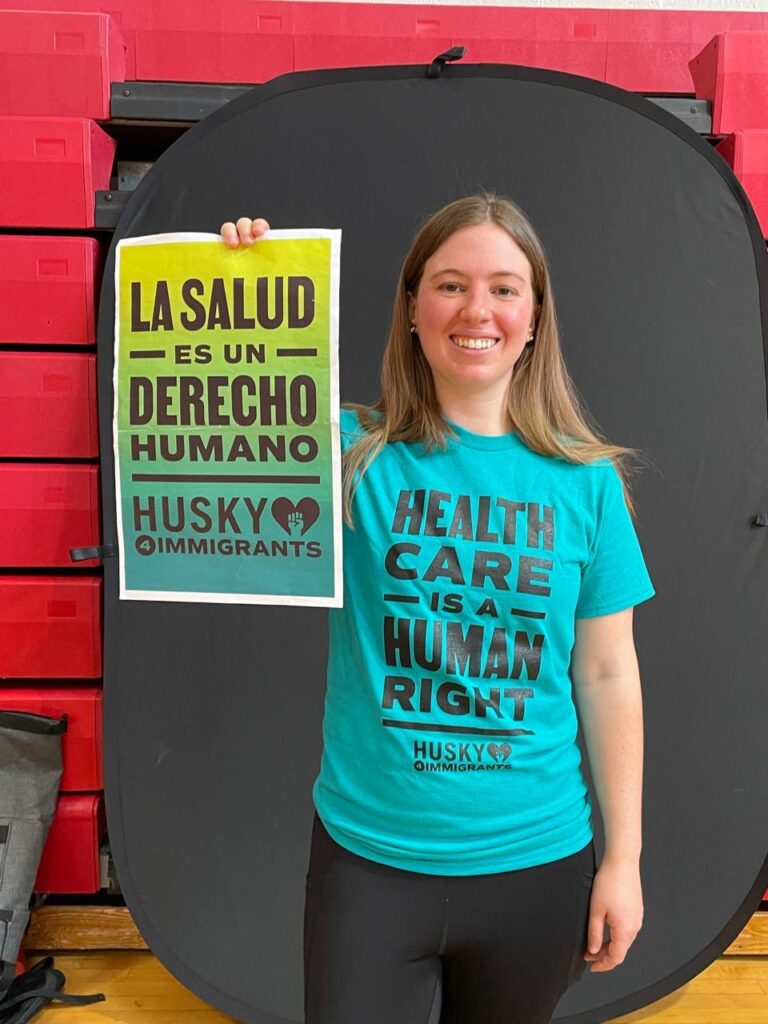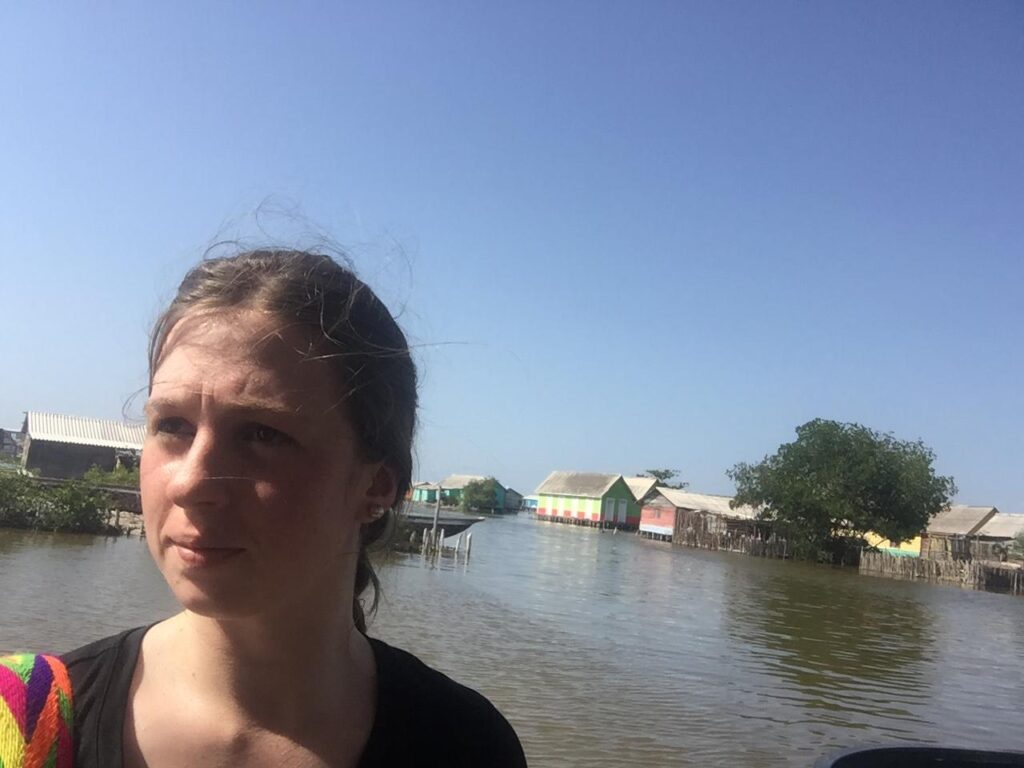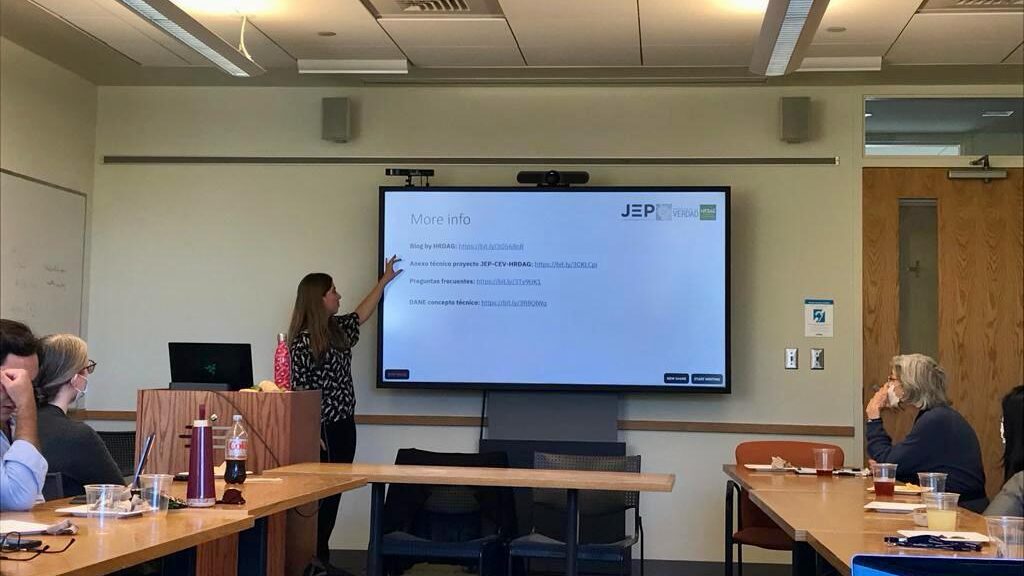Welcome to our first “Employee Spotlight,” where we shine a light on the talented individuals who make up Data-Pop Alliance. Our team members are what makes DPA thrive, and through this series, we aim to highlight their diverse backgrounds and inspiring stories. Today, we’re excited to feature Valentina Rozo Ángel, who recently joined DPA as a Project and Research Officer, working with the Data Feminism and Geographies of Inequalities Programs. Based in Mexico City and originally from Bogotá, Colombia, Valentina brings a wealth of experience and passion to our team. Join us as we explore her journey.
*This interview has been edited for clarity and brevity.
Tell us about your background (academic and professional) before joining DPA.
VR: I completed my undergraduate studies in Economics with a double major in Business from the Universidad de los Andes in Colombia, where I also earned my Master’s degree in Economics.
I began my career at Dejusticia, a Colombia-based Think-and-Do-Tank known for its work on constitutional litigation. As an economist on the litigation team, I collaborated with lawyers on cases for the Constitutional Court, aiming to advance human rights. After nearly five years at Dejusticia, I joined the Colombian Truth Commission. Colombia has one of the longest internal conflicts, involving guerrillas, paramilitary groups, and the State. Following the 2016 peace agreement with the largest guerrilla organization, several institutional bodies were created, including the Truth Commission. As the analytics lead, I directed quantitative research and managed the Geoportal and Dashboard, providing critical data. Our team of 28 people conducted over 30 projects using quantitative methods to address complex human rights issues.
After my tenure at the Truth Commission, I worked as a consultant for various organizations. I collaborated with the Human Rights Data Analysis Group (HRDAG), in San Francisco, the University of Essex on research linking traditional justice to economic development, and the World Wildlife Fund (WWF). Additionally, I contributed to the UN Special Rapporteur on extreme poverty and human rights, analyzing “non-takeable rights”—basic entitlements that people do not claim. For example, many are entitled to pensions but do not claim them for various reasons. Lastly, I worked with ACT Africa on an ethical AI index. Throughout my career, I have always been at the intersection of quantitative methods and human rights.
I knew about DPA because, for people like me working in data, human rights, inequality and poverty, DPA is a reference point."
Valentina Rozo Ángel
What do you enjoy doing outside of work?
VR: I love running. I started running almost two years ago, and since then, I haven’t stopped. I also have a dog who takes up a lot of my time, and I enjoy taking him on long walks. Since Mexico City is new to me and full of museums and amazing restaurants, I’ve been exploring it ever since I arrived. There are still many places I haven’t seen yet, so I like to get to know the city better whenever I have free time.

What inspired you to want to join DPA’s team?
VR: I knew about Data-Pop Alliance because, for people like me working in data, human rights, inequality, and poverty, DPA is a reference point. I had been following DPA for around four years and was particularly interested in the Data Feminism Program. The Program’s name is inspired by Catherine D’ignazio’s book, “Data Feminism”, which is one of my favorite books about using data in a responsible way.
I was inspired to apply and join the organization because I wanted to be part of a team that not only used data on a daily basis but also employed other methods. What I found very cool about DPA is that even though it has “data” in its name, not everything is about quantitative data. We are encouraged to use mixed-methods approaches to understand problems at every level. I wanted to be part of a team that had experts in quantitative, qualitative, and mixed-methods data. It seemed like a great environment to share knowledge and gain insights in areas where I am not yet an expert.
What excites you the most about your current work and role in DPA?
VR: I feel that I can learn about various topics. For example, I am currently involved in multiple projects that, while related in some ways, are thematically very different. In the past three weeks alone, I’ve been reading about feminist urbanism, care systems, and innovative approaches to measuring poverty using non-traditional data sources. This diversity has been incredibly stimulating and has made me eager to learn about subjects I hadn’t previously considered.
What excites me most about my work at DPA is the opportunity to explore multiple themes that are interconnected, all aimed at combating gender inequalities from different perspectives. It’s thrilling to delve into such a wide range of topics, all unified by a common goal.

In what ways do you hope to grow professionally during your time here?
VR: I aim to expand my knowledge in all areas that DPA works in. I’m particularly interested in the work our Data Science Team does, especially with AI, which is not my main area of expertise, so I would love to learn more about it. Additionally, I’m keen to deepen my understanding of qualitative methods. My colleagues on the Data Feminism team are experts in these approaches, and I’m eager to learn more about their research techniques, such as conducting interviews and focus groups.
What excites me most about my work at DPA is the opportunity to explore multiple themes that are interconnected, all aimed at combating gender inequalities from different perspectives.”
Valentina Rozo Ángel
VR: I am a strong believer in the power of data. To understand things, you need to measure them. Even if it’s not always possible to quantify everything, having an approximation is useful for tracking progress in policy development, for example.
“Changing the world with data” is a powerful statement, by that I mean that we need to establish a baseline and then understand how that baseline changes over time.
However, I also believe that quantitative data is not everything. This data is often biased because it doesn’t exist in a vacuum; it must be analyzed with an understanding of the environment and other unquantifiable variables. To make the world a better place with data, we need a mix of rigorous methods: quantitative methods to measure what we can and a recognition that quantitative data is not perfect.
What advice would you give to someone interested in pursuing a career in development economics and data?
VR: My advice would be to find something you are truly passionate about. Once you identify a specific topic, you will be eager to learn more about it, as well as the methods needed to solve the questions you’re interested in. So, my main advice is to find a question you are passionate about solving, learn a lot about it, and gain knowledge on the specific tools needed to address it. In data science, for instance, if you’re not interested in math, you might struggle with the equations. But if you have a strong motivation and a passion for solving a difficult question, you’ll be able to push through the less interesting phases. In sum, find a passion, discover ways to solve that question, and keep improving your toolkit to apply it to other important questions.
I believe that to make the world a better place with data, we need a mix of rigorous methods: quantitative methods to measure what we can and a recognition that quantitative data is not perfect.”
Valentina Rozo Ángel

To learn more about DPA’s team, visit this page.


![M002 - Feature Blog Post [WEB]](https://datapopalliance.org/wp-content/uploads/2025/10/M002-Feature-Blog-Post-WEB.png)





